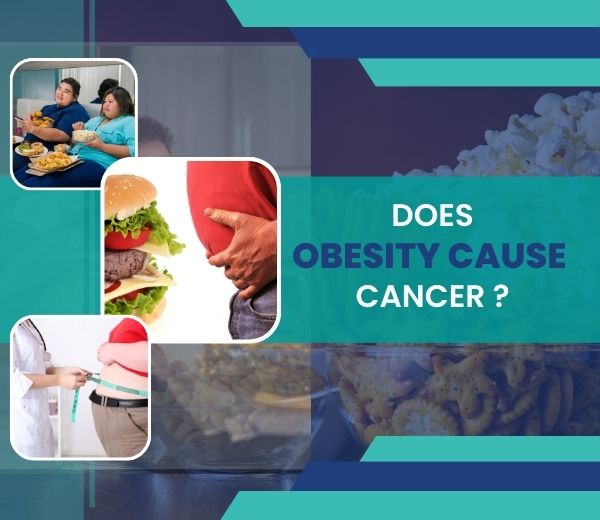Does Obesity Cause Cancer?
As you walk down a main road, you find yourself surrounded by tall billboards advertising the latest food chains. You look up to watch the burgers & kebabs in the larger than life size posters oozing molten cheese visually, AND finally succumb to the temptation by grabbing yourself one jumbo sized burger. With every bite, you recall this moment as a moment of bliss, without recognising the silent killer you have been injecting in your body for so long. This is the story of every modern man, deeply in the clutches of a lifestyle that promotes “More is less.” In a world, where we find ourselves with more & more options, gluttony is a sin that most of us have been committing mindlessly. But as they say, every sin has its nemesis, so the big question is what cost does this extravagant & mindless eating entail for our future?
Cohort studies conducted in the past few decades suggest that a large number of diseases that have risen are a result of a lifestyle; where more than half the diseases are due to dietary neglect and has less to do with scarcity of food & more to do with excess consumption. Studies blatantly indicate a whole range of cardiovascular diseases that have cropped up because of unhealthy consumption of food. But what we have seen as a nation is the stark rise of OBESITY among the masses that seem to perplex Dietitians, Health Experts et al because of its alarming propensity to cause massive health concerns.
But before we delve deep into the much debated question of whether obesity causes cancer, let us first try to understand, what Obesity actually is? At first, we must understand that the human anatomy for a proper & healthy functioning requires the maintenance of a healthy weight. The maintenance of a healthy weight is measured by what is known as BMI or body mass index which is an indicator of a person’s weight in proportion to the height. There is a standardised scale with regards to both males & females as well as on different age graphs. Again, contrary to popular misconception, for the normal functioning of the human body, fat is something that is essential to produce energy. However, when the fat deposit in the body is in excess or is in excess proportion, then we view it as obesity. When the BMI for age or at the sex specific showcases 95 percentile or above, then a person falls under the category of obesity & severe obesity. Apart from the BMI, there are other measurements that also showcase the distribution of fat or the risk of obesity. Such measurements include, waist circumference, waist to hip ratio etc. These measurements are as important as the BMI because the distribution of fat in specific regions is as important as the total amount of fat deposited in the body. For instance, the fat distribution in and around the visceral organs is more dangerous and susceptible to a large number of diseases than overall fat or fat in the subcutaneous regions.
Several studies that have been conducted in groups showcase an alarming indicator of obesity linking it with the rise in a number of cancers. For instance:
- Fat tissue or what is known as adipose increases the production of the hormone, oestrogen, which in turn increases the risk of breast, endometrial & ovarian cancer.
- People having obesity are more prone to have type 2 Diabetes & have high levels of insulin, which in turn can cause more chances of colon, kidney & prostate cancer.
- As fat deposits around the liver increases the risk of fatty liver which in turn can cause oxidative stress & DNA mutation, thereby increasing the chance of biliary tract & other cancers.
Apart from the detrimental effects obesity has on the physiological aspects in the way of cancer, studies show that obesity causes hindrance in screening too. For instance, women who are obsese have more chances of cervical cancer due to less effective screening of cervical cancer.
Moreover, even cancer survivors with obesity have reportedly shown chances of cancer recurrence, cancer progression and risk of certain second primary cancers. On the other hand, women who have been breast cancer survivors & reduced their body weight have shown improvement in the quality of life as well as considerable positive change in the biomarkers that have been otherwise linked with obesity & prognosis.
As such in the opinion of senior oncologist, Dr. Vikash Kumar Agarwal of VCCC, recognising the truth & veracity is the primary task when we are talking about obesity and cancer. Secondly, we must understand fully that there’s a difference between fat & obesity and while fat is essential for a healthy living, it is important to keep in mind that gorging on unhealthy food mindlessly increases the risk of obesity, which in turn is potentially responsible for a number of cancers. Hence his word of caution is to have a healthy balance of macro & micro nutrients and incorporate some exercises in our daily existence. He believes that our sedentary lifestyle is again responsible for the increased rate of obesity among the masses. As such, the key is to maintain a healthy & balanced diet, thereby eliminating the chances of cancer.


